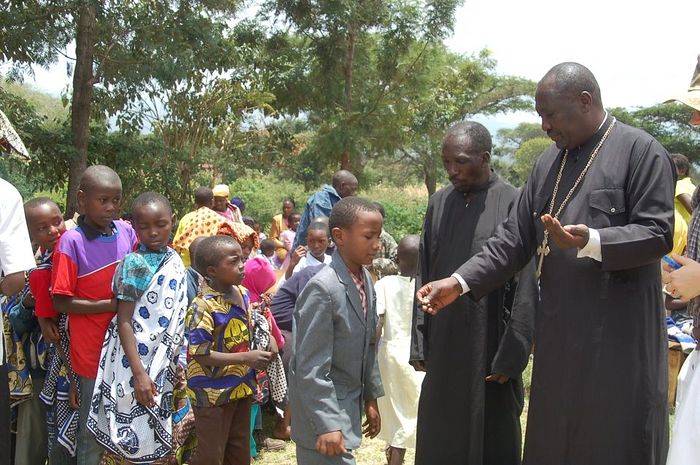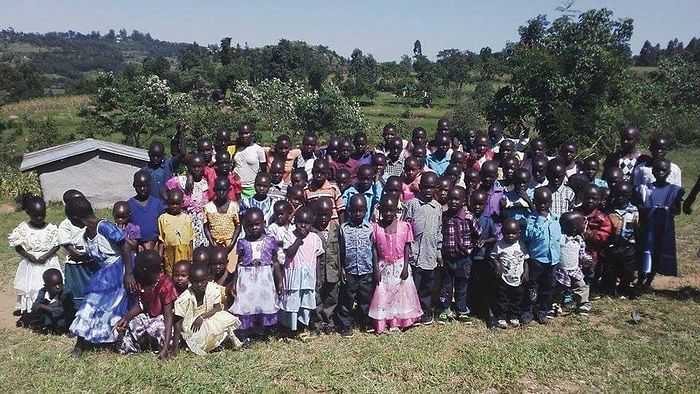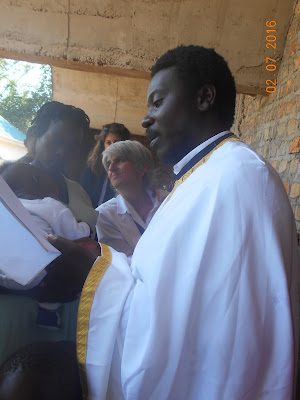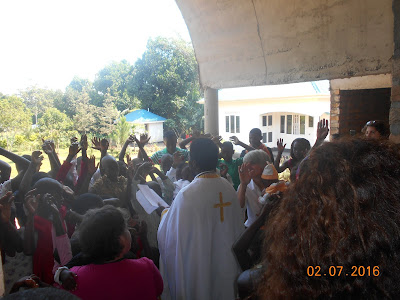—That’s part of why I’m going there. I know a girl that’s worked with OCMC for two years who wants to start a Church supply business in Kenya, but I don’t think there’s going to be a big enough market. I’m trying to assess what they can produce locally that’s needed locally. Why ship internationally? Let’s figure out what is the local market. That’s part of what I’ll be talking to them about.
Also, I get dozens of emails all the time from missions wanting to work with me, so I’ll be doing some inspections and making sure people are legitimate. I don’t know why, but people trust Americans more than Africans sometimes. So when I can vouch for a mission it puts people’s minds at ease and they start really working for them.
—I’m starting at St. Barnabas and there are two priests in that area that I’ll interview, and I’ll see Bishop Neofitos, about ninety kilometers from Nairobi.
The St. Barnabas Mission helps over three hundred children suffering from spiritual, economic, social, and physical poverty. The program tries to pair able people with these suffering children to help them become responsible and self-sustaining. Some of the children lived with terminally ill parents and elderly guardians who are sometimes physically and sexually abusive. There are many heart-breaking stories.
The mission also includes an education center started by Fr. Methodios JM Kariuki and his wife Papadhia Everlyn Mwangi who both graduated from seminary in Africa.
I’ll also go to the St. Tabitha Community Center where Fr. Agapios currently cares for eighteen orphans. There are many more that need care, but there simply is no space at the time. They try to provide food, clothing, shelter, clean water, a quality education, and empowerment to become productive members of society.
St. Tabitha’s is located in Kibera slums—the biggest slum in Africa. There’s over a million people with no running water or sanitation.
 The poor children of the Kibera slums sleep in such terrible conditions.
The poor children of the Kibera slums sleep in such terrible conditions.
—How do you feel about going there? Worried?
—I’ve been worse places. I’m a vet. I was in Fallujah and Baghdad.
—So you’ve been around.
—I’ve had bigger guys than most of those Africans try to kill me before.
—God has kept you protected.
—Thank God. So that will be interesting. Part of why I’m meeting with the bishops is to get more of a synergy built up between the missions so that they won’t be duplicating labor so much and trying to raise funds for so much duplicated work. For example, in Kibera it’s really expensive to try to rent and start an orphanage, but out in the villages it’s not too bad. So why don’t we have a priest serving Liturgy every day and run the orphanage outside of Kibera, and we can raise money to build something out there, and we can keep another priest inside Kibera, rescuing people, vetting, making sure he gets the worst of the worst, and other temporary services. And he can concentrate on that instead of constantly worrying about raising money, paying rent, getting caretakers and what not.
Some of the missions are just off doing their own thing to some degree. Why can’t we all work together and specialize?
—So there just hasn’t been much communication between the different institutions and missions?
—Right.
—Why do you think that is? Is that a mentality there, a lack of internet or … ?
—I don’t know yet. I’m hoping to find out. I can’t do much for anyone if they’re just not willing to work together, so we’ll see. And Orthodox Africa can give a more legitimate face to these missions, so they don’t have to just be relying on donations garnered from messaging people on Facebook or something like that.
—We’ve also posted several articles from a group called the Orthodox Missionary Fraternity which does a lot of work in Africa. We like to give people an idea of what’s going on around the world—not just in America and the Orthodox countries.
—That’s part of our goal with Orthodox Africa too. The Church is growing and there’s missions going on all over the place that people wouldn’t know about otherwise.
—So you’re helping to give people a more global, catholic sense of the Church.
—That’s one of the big things we want to accomplish in Africa. I’ll be doing some catechism classes, and they tell me that one of their consistent challenges is that Protestant missionaries are always trying to convince the people that Orthodoxy is just some new-fangled sect. So we’re trying to give people an idea of the catholicity of the Church.
—How are the Protestants able to accomplish this? They just have more people, more money, better organized?
—They’ve got more everything, unfortunately.
There’s a female monastery in Congo that does some mission work, and Bishop Neofitos wants to start a male monastery.
—What do you plan to talk about in catechism? Will it be pretty basic stuff, or have they learned that already?
—A lot of it will be to the orphan children, so it will be pretty basic. Honestly, I haven’t done this much and I’m somewhat scared about it! When I’ve talked to people they do seem to have a basic understanding. As a monastic I’m in tune with the life of prayer and monastic practice, but getting back to the ABC’s of Orthodoxy could be challenging. I hope God speaks through this ass! And I don’t have that much experience with kids either.
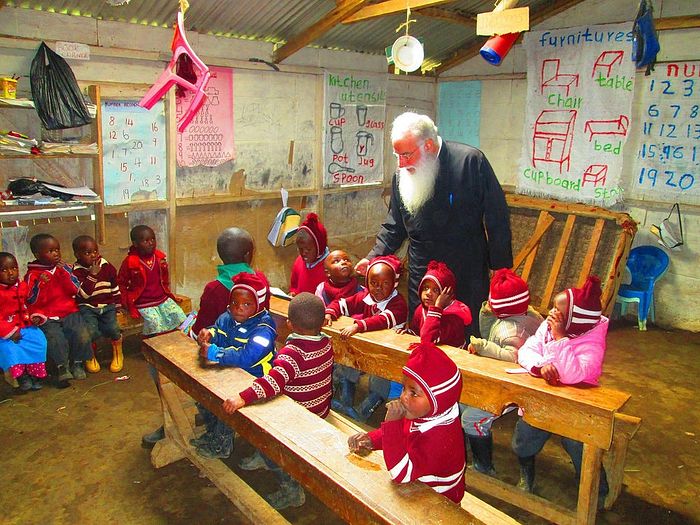 The children of the St. Barnabas Education Center are eager to learn!
The children of the St. Barnabas Education Center are eager to learn!
—Of course they like to play. I’ve been to the orphanage in Guatemala twice, and I like to play with them, but I’m older too, and I need to take a break. But they don’t want to take a break!
—The mission in Guatemala has been part of my inspiration. I’ve been talking with Presvytera Alexandra who’s teaching the locals how to sew vestments to support their mission. They have a site for
Mayan artisans, and the locals are selling vestments with locally-produced fabrics. That’s one of the business ideas I have in mind, and I’m pushing them to become self-sustaining, although I don’t know yet how we’ll get there.
I think that will play well with the bishops, because I think that’s ultimately what they would like to see as well. They don’t want to have to be dependent.
—How long will you be there?
—Twenty-five days.
—Are there already plans to go back after that, or you’ll see how it goes?
—It’s undecided. We make plans, and God laughs.
We have a Russian woman working with us on translations, so we’re hoping to have the site up and running for Russians to be able to learn about it and get involved. There are special pleas for the different missions on the website that have basic details.
The Kingdom is taken by violence and force. That implies to me in a lot of ways that we can’t sit on the sidelines as passive observers. We have to engage. You can’t sit by and wait for somebody else to do it. That’s what Orthodox Africa is for me—I saw a gap where there was a need and I asked myself what I could do, and Orthodox Africa is what I can do, so I went out and did it, and it’s developed from there with other people getting interested and joining in. It’s an invitation to everyone out there to get off their couches, and even if they can’t personally go travel and be a missionary, here’s one way they can be involved. Everyone has to be involved in some way in the furtherance of the Kingdom of God. Produce some good fruit. Think of the parables of the Widow’s Mite and of the Good Steward. Be a good steward with what you’ve been given, even if it’s just something like internet access. I have internet access and a lot of these missions don’t—so what can I do with this?
—And with the internet we can go all around the world and make any kind of connections we want.
—Right, so really we’re just inviting people to help. On the site we have Matthew 25 scattered all over it. Did you clothe the naked, feed the hungry, and visit those in prison? Did you, did you, did you? Here’s your chance—do it. It’s small, but everything makes a difference.
Orthodox Africa isn’t me. It’s everybody on the team and we’re all equal. I’m the guy that pushes the people, and holds their hands to the fire, and it’s an invitation to the Orthodox world, especially North America to get involved in any way you can. I’m vetting all these people for you, so if you have worries about legitimate Orthodox missions and you want to help but you’re worried about scams, here’s all the information you could possibly want.
—That’s very good because I used to get almost daily messages from random people in Africa asking for money. One man, when I told him I was already helping some other people, immediately turned on me and cursed me and told me I’m a terrible human being and that I have no love for humanity. This is what people are worried about.
—Exactly. And I’d like to reiterate that the Kingdom of Heaven is taken by force, and we should all get involved and not be just passive observers.
—You’re making it so easy for us to get involved, that if we don’t, we’re just total bums.
—That’s exactly the idea. It really is. It’s missions for dummies. There’s so much we can do. On a personal level, obviously I’m pushing Africa, but I don’t really care. If this pricks your conscience and you go figure out what you can do for Guatemala or Thailand or anywhere else then that’s great. This is about building up the Church. I just had to pick an avenue so I went with Africa.
—And I hope that your work and this interview can do just that—inspire people to support Orthodox Africa and even find their own ways to help however and wherever they can. Thank you for your time, Father.
—And thank you. Please pray for me as I travel to and throughout Africa!
* * *
Learn more about the work of Orthodox Africa on its
main page and also on
Facebook.
To read more about the specific needs of each mission and to donate,
see here.
05 / 07 / 2016

















